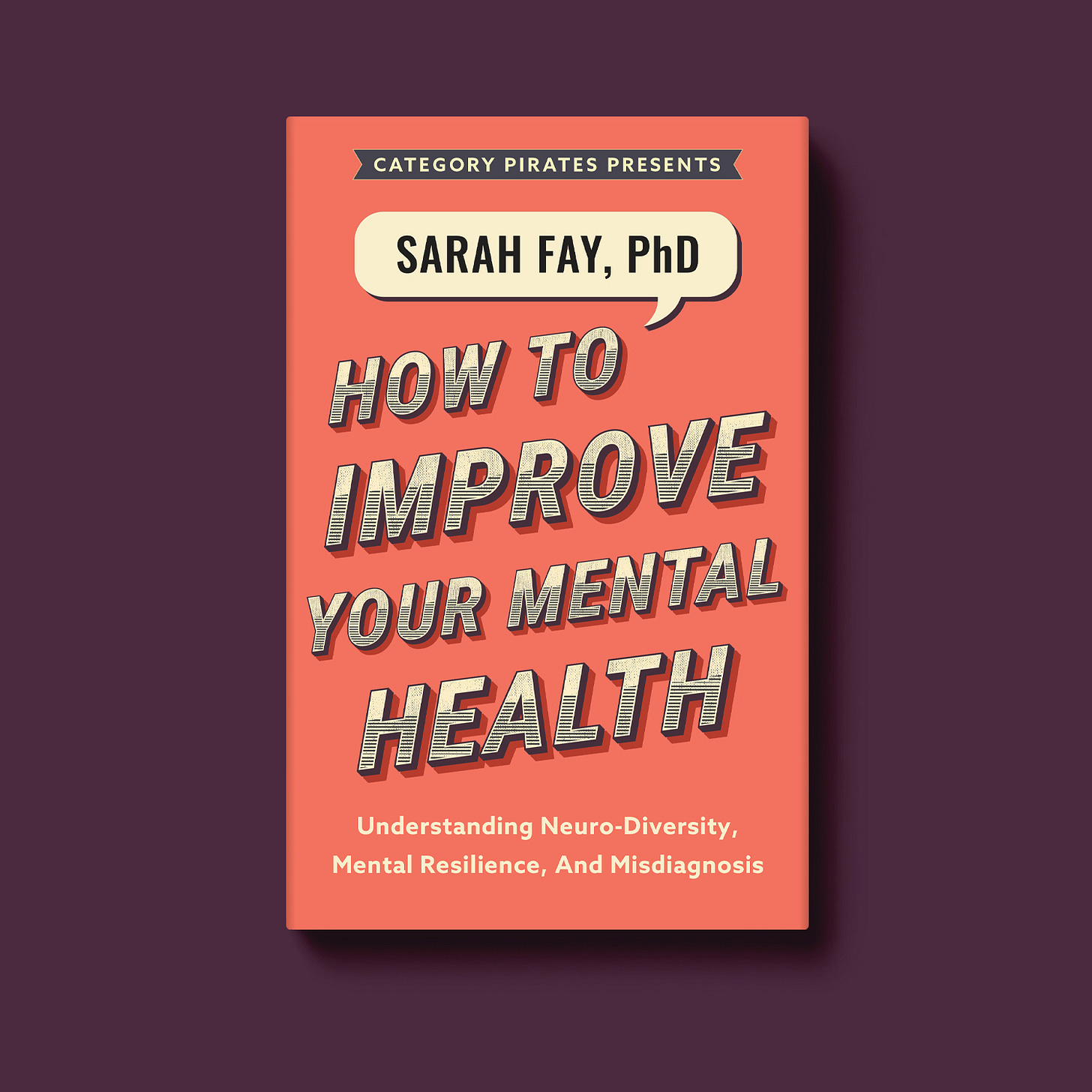Sarah Fay, PhD: How To Improve Your Mental Health
Neuro-Diversity, Mental Resilience, And The True Story of Six Misdiagnoses
Arrrrr! 🏴☠️ Welcome to a 🔒 subscriber-only edition 🔒 of Category Pirates. Each week, we share radically different ideas to help you design new and different categories. For more: Dive into an audiobook | Listen to a category design jam session | Enroll in the free Strategy Sprint email course
This Pirate Profile is inspired by Sarah Fay on Christopher Lochhead's Follow Your Different podcast.
Pirate Profiles is a series by Category Pirates spotlighting legendary Category Designers across a wide range of industries and disciplines.
In these Pirate Profiles, you will discover:
Untold stories of Category Designers who shaped the world we live in today (that you probably have never heard of before—but whose products, services, and platforms you have used thousands of times!).
The radically different POVs these Category Designers evangelized in the world—and the obstacles they had to overcome to move people’s thinking FROM where it was TO somewhere new.
Their strategies, frameworks, and mental models for successfully designing & dominating new categories of consequence.
Every legendary entrepreneur, executive, investor, and creator of any kind is a Category Designer.
We want to tell their stories—because the best way to become a Pirate is to study other Pirates.
ARRRRRRRRR!!!!!!!
Dear Friend, Subscriber, and Category Pirate,
Nearly one in five Americans (about 53 million people) live with a mental illness, according to research done by The National Institute of Mental Health.
Yet, scientists, doctors, and researchers know very little about what causes these illnesses. Neuroscientists have learned a lot about how the brain works in the past few decades, but the underlying biology of mental illnesses is poorly understood. And while all mental health professionals use the Diagnostic and Statistical Manual of Mental Disorders (DSM)—aka the Bible of psychiatry—to diagnose mental illnesses, it's more like a placeholder than a rigorous scientific textbook.
Diagnoses can be positive when they:
Increase the likelihood of a person getting treatment
Lead a person to join a community with the same diagnosis
Empower people to seek a solution
But diagnoses can also send people into a negative spiral—as was the case for Sarah Fay.
That’s why Sarah Fay, author and Ph.D., says all DSM diagnoses are misdiagnoses.
Fay was a guest on Pirate Christopher’s Follow Your Different podcast, where the two talked about her best-selling memoir, Pathological: The True Story of Six Misdiagnoses. In this fantastic book, Fay shows the damaging effects of people accepting a mental illness diagnosis without questioning—and her path to health and fulfillment.
In this Pirate Profile, we're sharing her story and insights.
Dr. Sarah Fay Is An Award-Winning Author, Mental Health Advocate, And Peer Recovery Specialist
“For me, each mental health diagnosis was a self-fulfilling prophecy.” –Sarah Fay
The misdiagnoses began when Fay was 13 years old.
Her parents were divorcing, she was attending a new high school, and she developed a terrible stomachache. “I was horribly sad and did not know how to process my emotions.” The sadness made her lose her appetite. The stomachache made her reject food.
So she stopped eating.
“My parents rightly took me to the hospital and I saw a pediatrician,” says Fay. “He weighed me and said, ‘She has anorexia.' He didn't ask questions about context.” The diagnosis made her see herself through a lens of disease, affecting her emotions, thoughts, and behaviors. “I didn't have anorexia. I was an anorexic.”
After a few years of professional support, Fay began eating normally again and feeling better about herself. But mental health issues would not abandon her completely. She would later be diagnosed with:
Major Depressive Disorder (MDD)
Anxiety Disorder
Attention Deficit Hyperactivity Disorder (ADHD)
Obsessive-Compulsive Disorder (OCD)
Bipolar Disorder
Through each misdiagnosis, Fay pursued a life in academia, receiving an MFA and a Ph.D., teaching writing at various universities, publishing in reputable magazines and newspapers, and writing a best-selling book.
But, oftentimes, she had trouble functioning.
Fay was diagnosed with bipolar disorder in her 40s. As a result of the diagnosis, she thought she could never hold a full-time job, live independently (she moved in with her mother), or have another long-term relationship. Things started to turn around after she visited a physician in Chicago.
Fay expected the doctor to confirm her previous diagnoses.
Instead, he said, “I don’t know what you have.”
Nobody had said that to her before. Doctors had always given her a quick diagnosis after a 15-minute appointment. But this experience caused her to research the origin of mental health diagnoses.
While researching, she discovered the limitations of the DSM and the biases it creates toward women. The information pushed her to write her memoir, Pathological, and become a mental health advocate to change the conversations around mental health, which includes:
Founding Pathological: The Movement, a public awareness campaign devoted to empowering people to make knowledgeable decisions about their mental health
Contributing to many publications, including The New York Times, The Atlantic, Time Magazine, Oprah Daily, and The Paris Review, where she served as an advisory editor
Being chosen as a Notable Mention in Best American Essays and nominated for Pushcart Prizes
Receiving the Hopwood Award for Literature, as well as grants and fellowships from Yaddo, the Mellon Foundation, and the MacDowell Colony, among others
Serving on the faculty at DePaul University and Northwestern University
Her work, and this Pirate Profile, aim to help destigmatize mental illness for anyone who may be impacted by it.




